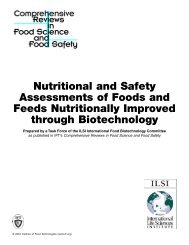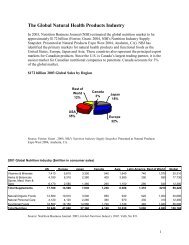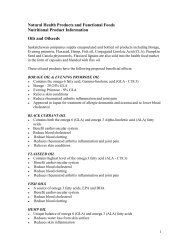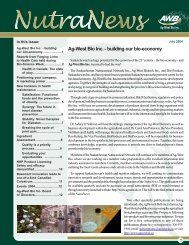Beyond Borders: Global biotechnology report 2010
Beyond Borders: Global biotechnology report 2010
Beyond Borders: Global biotechnology report 2010
You also want an ePaper? Increase the reach of your titles
YUMPU automatically turns print PDFs into web optimized ePapers that Google loves.
companies will not make any large up-front<br />
payments. Pfizer’s 2008 transaction with<br />
Medivation, for example, included a US$225<br />
million up-front payment.<br />
Included among the largest deals in 2009<br />
were two by AstraZeneca. The first was<br />
its September transaction with Northern<br />
California-based Nektar Therapeutics for<br />
two drugs intended to address the side<br />
effects associated with certain painkillers<br />
(including an up-front payment of US$125<br />
million and development and nearerterm<br />
regulatory milestones of US$235<br />
million). The second deal followed in<br />
December, and was with North Carolinabased<br />
Targacept for a drug candidate<br />
targeted at depression (including an<br />
up-front payment of US$200 million and<br />
development and nearer-term regulatory<br />
milestones of US$540 million). One of the<br />
milestones in the Targacept transaction is<br />
first commercial sale — a reflection of the<br />
times. It is no longer enough to prove that<br />
a drug is safe and effective; it also must be<br />
approved for reimbursement by payors at<br />
a reasonable price.<br />
Novartis also got into the large-alliance<br />
act when it partnered with Incyte around<br />
a Phase III drug for the treatment of<br />
myelofibrosis and an earlier-stage cancer<br />
compound that included a US$150<br />
million up-front license fee. Importantly,<br />
Incyte retains US rights to the drug — an<br />
increasingly visible trend that we discussed<br />
in last year’s <strong>Beyond</strong> borders. As global<br />
markets, particularly in emerging countries,<br />
increase in importance, pharma partners<br />
are often more willing to accept (and pay<br />
handsomely for) ex-US rights. This allows<br />
the biotech to transition to commercial<br />
operations and control top-line revenue<br />
in an important market — a key driver of<br />
shareholder value.<br />
Novartis made one of the largest upfront<br />
license payments of the year when<br />
it paid Vanda Pharmaceuticals US$200<br />
million for the US and Canadian rights to<br />
the schizophrenia drug Fanapt. This drug<br />
has had its own circuitous path through<br />
development. It was originally licensed<br />
to US-based Titan Pharmaceuticals from<br />
Hoechst, the German drug maker that<br />
78 <strong>Beyond</strong> borders <strong>Global</strong> <strong>biotechnology</strong> <strong>report</strong> <strong>2010</strong><br />
was later merged into Aventis. Titan<br />
immediately licensed it out to Novartis.<br />
Novartis returned the drug to Titan after an<br />
earlier clinical setback, which then licensed<br />
it to Vanda. To the surprise of many, the<br />
FDA approved the drug in 2009, which<br />
resulted in Novartis re-entering the picture<br />
for a second time.<br />
Other deals with large up-fronts in 2009<br />
included sanofi-aventis and Exelixis for<br />
several cancer drugs (US$140 million);<br />
Astellas and Medivation for a drug to treat<br />
prostate cancer (US$110 million); and<br />
Biogen Idec and Acorda Therapeutics for<br />
ex-US rights to Fampridine-SR, which was<br />
approved by the FDA in early <strong>2010</strong> to help<br />
improve walking in patients with multiple<br />
sclerosis (US$110 million). Biogen-Idec<br />
was the only US GAAP-<strong>report</strong>ing company<br />
to pay an up-front fee in excess of<br />
US$100 million.<br />
Among US pharmas, Bristol-Myers<br />
Squibb extended its “string of pearls”<br />
strategy (refer to the article by James<br />
Cornelius in last year’s <strong>Beyond</strong> borders<br />
for more details) by completing significant<br />
transactions with two Seattle-area biotech<br />
companies — ZymoGenetics and Alder<br />
Biopharmaceuticals. Both transactions<br />
included up-front payments of US$85<br />
million. In the Zymogenetics deal, BMS<br />
gets rights to an early-stage drug program<br />
for the treatment of hepatitis C, and from<br />
Alder, BMS gains rights to a Phase II biologic<br />
for the treatment of rheumatoid arthritis.<br />
Johnson & Johnson took a somewhat novel<br />
approach to gaining access to products<br />
while sparing its income statement from the<br />
burden of an up-front license payment. J&J<br />
acquired significant stakes in two European<br />
biotech companies, Elan and Crucell,<br />
obtaining product rights in the process.<br />
In the Crucell arrangement, J&J obtained<br />
the rights to co-develop Crucell’s universal<br />
monoclonal antibody for the treatment








